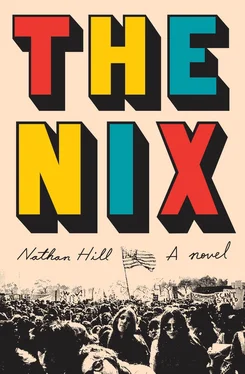Why this has become so compelling he isn’t really sure.
Tonight it’s twenty elves armed and armored against this one dragon because it is a very large dragon. With razor-sharp teeth. Plus it breathes fire. Plus it’s covered in scales the thickness of sheet metal, which is something they can see if their graphics card is good enough. The dragon appears to be asleep. It is curled catlike on the floor of its magma-rich lair, which is set inside a hollowed-out volcano, naturally. The ceiling of the lair is high enough to allow for sustained dragon flight because during the battle’s second phase the dragon will launch into the air and circle them from above and shoot fiery bombs onto their heads. This will be the fourth time they’ve tried to kill this dragon; they have never made it past phase two. They want to kill it because the dragon guards a heap of treasure and weapons and armor at the far end of the lair, the looting of which will be sweet vis-à-vis their war against the orcs. Veins of bright-red magma glow just under the ground’s rocky surface. They will break open during the third and final phase of the fight, a phase they have not yet seen because they just cannot get the hang of the fireball-dodging thing.
“Did you all watch the videos I sent?” asks their raid leader, an elf warrior named Pwnage. Several players’ avatars nod their heads. He had e-mailed them tutorials showing how to defeat this dragon. What Pwnage wanted them to pay attention to was how to manage phase two, the secret to which seems to be to keep moving and avoid getting bunched up.
LETS GO!!! writes Axman, whose avatar is currently dry-humping a rock wall. Several elves dance in place while Pwnage explains the fight to them, again.
Samuel plays Elfscape from his office computer because of the faster internet connection, which can increase his damage output in a raid like this by up to two percent, usually, unless there’s some bandwidth-traffic problems, like when students are registering for classes. He teaches literature at a small university northwest of Chicago, in a suburb where all the great freeways split apart and end at giant department stores and corporate office parks and three-lane roads clogged with vehicles driven by the parents who send their children to Samuel’s school.
Children like Laura Pottsdam — blond, lightly freckled, dressed sloppily in logoed tank tops and sweatshorts with various words written across the butt, majoring in business marketing and communication, and who, this very day, showed up to Samuel’s Introduction to Literature course, handed in a plagiarized paper, and promptly asked if she could leave.
“If we’re having a quiz,” she said, “I won’t leave. But if we’re not having a quiz, I really need to leave.”
“Is there an emergency?” Samuel said.
“No. It’s just that I don’t want to miss any points. Are we doing anything today worth points?”
“We’re discussing the reading. It’s information you’ll probably want to know.”
“But is it worth points ?”
“No, I suppose not.”
“Then, okay, I really have to leave.”
They were reading Hamlet, and Samuel knew from experience that today would be a struggle. The students would be spent, worn down by all that language. The paper he had assigned was about identifying logical fallacies in Hamlet’s thinking, which even Samuel had to admit was sort of a bullshit exercise. They would ask why they had to do this, read this old play. They would ask, When are we ever going to need to know about this in real life?
He was not looking forward to this class.
What Samuel thinks about in these moments is how he used to be a pretty big deal. When he was twenty-four years old a magazine published one of his stories. And not just any magazine, but the magazine. They did a special on young writers. “Five Under Twenty-Five,” they called it. “The next generation of great American authors.” And he was one of them. It was the first thing he ever published. It was the only thing he ever published, as it turned out. There was his picture, and his bio, and his great literature. He had about fifty calls the next day from big-shot book people. They wanted more work. He didn’t have more work. They didn’t care. He signed a contract and was paid a lot of money for a book he hadn’t even written yet. This was ten years ago, back before America’s current financial bleakness, before the crises in housing and banking left the world economy pretty much shattered. It sometimes occurs to Samuel that his career has followed roughly the same trajectory as global finance: The good times of summer 2001 seem now, in hindsight, like a pleasant and whimsical daydream.
LETS GOOOOOOOO!!! Axman writes again. He has stopped humping the cave wall and is now leaping in place. Samuel thinks: ninth grade, tragically pimpled, hyperactivity disorder, will probably someday end up in my Intro to Lit class.
“What did you think about Hamlet ?” Samuel had asked his class today, after Laura’s departure.
Groans. Scowls. Guy in the back held his hands aloft to show his two big meat-hook thumbs pointing down. “It was stupid,” he said.
“It didn’t make any sense,” said another.
“It was too long,” said another.
“ Way too long.”
Samuel asked his students questions he hoped would spark any kind of conversation: Do you think the ghost is real or do you think Hamlet is hallucinating? Why do you think Gertrude remarried so quickly? Do you think Claudius is a villain or is Hamlet just bitter? And so on. Nothing. No reaction. They stared blankly into their laps, or at their computers. They always stare at their computers. Samuel has no power over the computers, cannot turn them off. Every classroom is equipped with computers at every single seat, something the school brags about in all the marketing materials sent to parents: Wired campus! Preparing students for the twenty-first century! But it seems to Samuel that all the school is preparing them for is to sit quietly and fake that they’re working. To feign the appearance of concentration when in fact they’re checking sports scores or e-mail or watching videos or spacing out. And come to think of it, maybe this is the most important lesson the school could teach them about the American workplace: how to sit calmly at your desk and surf the internet and not go insane.
“How many of you read the whole play?” Samuel said, and of the twenty-five people in the room, only four raised their hands. And they raised their hands slowly, shyly, embarrassed at having completed the assigned task. The rest seemed to reproach him — their looks of contempt, their bodies slumped to announce their huge boredom. It was like they blamed him for their apathy. If only he hadn’t assigned something so stupid, they wouldn’t have had to not do it.
“Pulling,” says Pwnage, who now sprints toward the dragon, giant ax in hand. The rest of the raid group follows, crying wildly in a proximate imitation of movies they’ve seen about medieval wars.
Pwnage, it should be noted, is an Elfscape genius. He is a video-game savant. Of the twenty elves here tonight, six are being controlled by him. He has a whole village of characters that he can choose from, mixing and matching them depending on the fight, a whole self-sustaining micro-economy between them, playing many of them simultaneously using an incredibly advanced technique called “multiboxing” that involves several networked computers linked to a central command brain that he controls using programmed maneuvers on his keyboard and fifteen-button gaming mouse. Pwnage knows everything there is to know about the game. He’s internalized the secrets of Elfscape like a tree that eventually becomes one with the fence it grows next to. He annihilates orcs, often delivering the killing blow to his signature phrase: I just pwned ur face n00b!!!
Читать дальше












